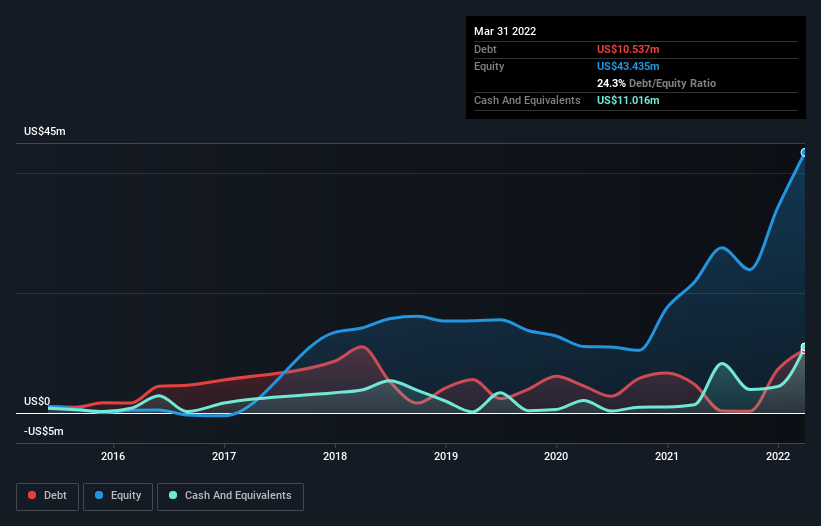Some say volatility, rather than debt, is the best way to think about risk as an investor, but Warren Buffett famously said that 'Volatility is far from synonymous with risk.' So it might be obvious that you need to consider debt, when you think about how risky any given stock is, because too much debt can sink a company. We note that Vicinity Motor Corp. (CVE:VMC) does have debt on its balance sheet. But the real question is whether this debt is making the company risky.
When Is Debt Dangerous?
Debt assists a business until the business has trouble paying it off, either with new capital or with free cash flow. Ultimately, if the company can't fulfill its legal obligations to repay debt, shareholders could walk away with nothing. However, a more usual (but still expensive) situation is where a company must dilute shareholders at a cheap share price simply to get debt under control. Of course, debt can be an important tool in businesses, particularly capital heavy businesses. When we examine debt levels, we first consider both cash and debt levels, together.
View our latest analysis for Vicinity Motor
What Is Vicinity Motor's Debt?
The image below, which you can click on for greater detail, shows that at March 2022 Vicinity Motor had debt of US$10.5m, up from US$4.80m in one year. However, it does have US$11.0m in cash offsetting this, leading to net cash of US$479.0k.

How Healthy Is Vicinity Motor's Balance Sheet?
We can see from the most recent balance sheet that Vicinity Motor had liabilities of US$28.8m falling due within a year, and liabilities of US$1.03m due beyond that. On the other hand, it had cash of US$11.0m and US$5.36m worth of receivables due within a year. So it has liabilities totalling US$13.5m more than its cash and near-term receivables, combined.
While this might seem like a lot, it is not so bad since Vicinity Motor has a market capitalization of US$61.6m, and so it could probably strengthen its balance sheet by raising capital if it needed to. But it's clear that we should definitely closely examine whether it can manage its debt without dilution. Despite its noteworthy liabilities, Vicinity Motor boasts net cash, so it's fair to say it does not have a heavy debt load! There's no doubt that we learn most about debt from the balance sheet. But ultimately the future profitability of the business will decide if Vicinity Motor can strengthen its balance sheet over time. So if you're focused on the future you can check out this free report showing analyst profit forecasts.
In the last year Vicinity Motor had a loss before interest and tax, and actually shrunk its revenue by 38%, to US$23m. That makes us nervous, to say the least.
So How Risky Is Vicinity Motor?
Statistically speaking companies that lose money are riskier than those that make money. And we do note that Vicinity Motor had an earnings before interest and tax (EBIT) loss, over the last year. Indeed, in that time it burnt through US$30m of cash and made a loss of US$12m. With only US$479.0k on the balance sheet, it would appear that its going to need to raise capital again soon. Overall, we'd say the stock is a bit risky, and we're usually very cautious until we see positive free cash flow. The balance sheet is clearly the area to focus on when you are analysing debt. However, not all investment risk resides within the balance sheet - far from it. Be aware that Vicinity Motor is showing 5 warning signs in our investment analysis , and 2 of those are concerning...
When all is said and done, sometimes its easier to focus on companies that don't even need debt. Readers can access a list of growth stocks with zero net debt 100% free, right now.
New: Manage All Your Stock Portfolios in One Place
We've created the ultimate portfolio companion for stock investors, and it's free.
• Connect an unlimited number of Portfolios and see your total in one currency
• Be alerted to new Warning Signs or Risks via email or mobile
• Track the Fair Value of your stocks
Have feedback on this article? Concerned about the content? Get in touch with us directly. Alternatively, email editorial-team (at) simplywallst.com.
This article by Simply Wall St is general in nature. We provide commentary based on historical data and analyst forecasts only using an unbiased methodology and our articles are not intended to be financial advice. It does not constitute a recommendation to buy or sell any stock, and does not take account of your objectives, or your financial situation. We aim to bring you long-term focused analysis driven by fundamental data. Note that our analysis may not factor in the latest price-sensitive company announcements or qualitative material. Simply Wall St has no position in any stocks mentioned.
About TSXV:VMC
Vicinity Motor
Designs, builds, and distributes a suite of transit buses for public and commercial use under the Vicinity brand in the United States and Canada.
Slight and slightly overvalued.
Similar Companies
Market Insights
Weekly Picks


Crazy Undervalued 42 Baggers Silver Play (Active & Running Mine)


Fiducian: Compliance Clouds or Value Opportunity?

Willamette Valley Vineyards (WVVI): Not-So-Great Value
Recently Updated Narratives

Moderation and Stabilisation: HOLD: Fair Price based on a 4-year Cycle is $12.08


Positioned globally, partnered locally


When will fraudsters be investigated in depth. Fraud was ongoing in France too.
Popular Narratives


MicroVision will explode future revenue by 380.37% with a vision towards success


NVDA: Expanding AI Demand Will Drive Major Data Center Investments Through 2026





